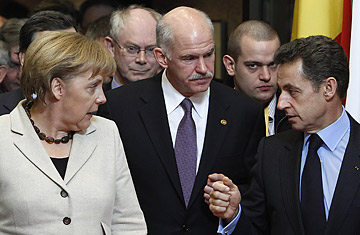
From left: German Chancellor Angela Merkel, European Union President Herman Van Rompuy (back row), Greek Prime Minister George Papandreou and French President Nicolas Sarkozy leave the E.U. Council building after a meeting
Almost exactly 100 years ago, Albert Einstein, Marie Curie, Max Planck and other dazzling minds of the era gathered at the Solvay Library in Brussels for a major physics conference. Meeting in the same neo-classical library on Thursday to find an urgent solution to Greece's debt crisis and save the imperiled euro, European Union leaders would probably have relished the chance to connect with those bygone eggheads for inspiration. But no matter — their decision, as it turns out, was a no-brainer. In an emphatic message to the speculators around the world who are betting billions on the euro's downfall, the E.U. leaders pledged to rescue debt-plagued Greece to ensure the long-term viability of the single currency and, in effect, of the bloc itself.
Although the pledge to help Greece was sincere, it was light on specifics. After the new E.U. president, Herman Van Rompuy, announced that the leaders of Germany, France and Greece — along with himself and Jean-Claude Trichet, head of the European Central Bank — had reached an agreement, the leaders then passed the issue over to their subordinates to hammer out the details. There was no call for an emergency bailout or help from the International Monetary Fund. Instead, the 27 E.U. members promised to underwrite the Greek economy through loans, guarantees and other measures, so long as Athens maintained a tight austerity program.
It remains to be seen whether the strong message of support will have the intended effect. The euro rallied early in the day but then fell 0.9%, to below $1.36, as traders criticized the lack of details in the rescue package. E.U. officials insist that although the specifics still need to be worked out, the agreement should end the speculation against the euro.
Van Rompuy, who was appointed president of the newly restructured E.U. following the passage of the Lisbon Treaty last year, proved to be the linchpin of the deal. The former Belgian Prime Minister is uniquely equipped to understand the importance of projecting confidence to assure shaky markets — he has a master's degree in applied economics and worked for the Belgian Central Bank before going into politics. And as Belgium's Budget Minister in the 1990s, he was instrumental in helping to drive the country's public debt down from a peak of 135% of GDP in 1993 to about 90% today.
Speaking to the E.U. leaders attending the summit — including Angela Merkel of Germany, Nicolas Sarkozy of France and Gordon Brown of Britain — Van Rompuy said the 16 countries in the euro zone had a "shared responsibility" for economic stability and would take "coordinated and determined" action to safeguard financial stability. But Van Rompuy was also stern about what was expected from Greece: it must reduce its budget deficit (which now exceeds 12.7% of GDP) in an "effective and determined manner." Athens now faces stringent oversight as it attempts to balance its finances: after years of receiving dodgy statistics from the Greek authorities, the E.U. is insisting on a direct role in monitoring the nation's recovery plan. And next week, E.U. finance ministers are expected to formally demand the steps Greece needs to take to reduce its deficit by 4% this year.
Greece's task is massive. Its deficit is the biggest in the euro zone and four times larger than the 3% maximum permitted for members of the single currency. Frugal Germany, the E.U.'s traditional paymaster, was understandably reluctant to commit to underwrite any rescue pledge before securing a cast-iron commitment from Athens that it would put its finances in order. Earlier in the day, Otmar Issing, the German former chief economist of the European Central Bank, said the Greeks enjoyed "one of the most luxurious pensions systems in the world" and that it was unreasonable to expect German taxpayers to fund it. Merkel's message of support included a hint of steel. Greece "will not be left on its own, but there are rules, and these rules must be adhered to," she said.
Nonetheless, it was unthinkable that the E.U. would sit idly by and watch Greek finances crumble a mere 11 years after the euro's birth. European leaders are keenly aware that the crisis is not restricted to Greece. If the nation were allowed to default on its debts, the bug could spread to other highly indebted euro-zone economies, like those of Spain and Portugal. At that point, economists have said, the euro itself could be endangered. But the E.U. sent a message on Thursday that it was not about to let that happen. Now it's banking on the hope that its public show of solidarity will restore a sense of confidence in the currency. Boring as it may be, stability is all the euro zone wants right now.
